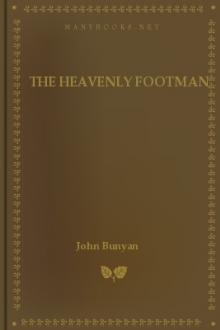The Children's Own Longfellow - Henry W. Longfellow (reading a book .TXT) 📗

- Author: Henry W. Longfellow
Book online «The Children's Own Longfellow - Henry W. Longfellow (reading a book .TXT) 📗». Author Henry W. Longfellow
These things beheld in dismay the crowd on the shore and on shipboard. Speechless at first they stood, then cried aloud in their anguish, "We shall behold no more our homes in the village of Grand-Pre!" Loud on a sudden the cocks began to crow in the farm-yards, Thinking the day had dawned; and anon the lowing of cattle Came on the evening breeze, by the barking of dogs interrupted. Then rose a sound of dread, such as startles the sleeping encampments Far in the western prairies or forests that skirt the Nebraska, When the wild horses affrighted sweep by with the speed of the whirlwind, Or the loud bellowing herds of buffaloes rush to the river. Such was the sound that arose on the night, as the herds and the horses Broke through their folds and fences, and madly rushed o'er the meadows.
PART THE FIRST V Pg 24
Overwhelmed with the sight, yet speechless, the priest and the maiden Gazed on the scene of terror that reddened and widened before them; And as they turned at length to speak to their silent companion, Lo! from his seat he had fallen, and stretched abroad on the sea-shore Motionless lay his form, from which the soul had departed. Slowly the priest uplifted the lifeless head, and the maiden Knelt at her father's side, and wailed aloud in her terror. Then in a swoon she sank, and lay with her head on his bosom. Through the long night she lay in deep, oblivious slumber; And when she awoke from the trance, she beheld a multitude near her. Faces of friends she beheld, that were mournfully gazing upon her, Pallid, with tearful eyes, and looks of saddest compassion. Still the blaze of the burning village illumined the landscape, Reddened the sky overhead, and gleamed on the faces around her, And like the day of doom it seemed to her wavering senses. Then a familiar voice she heard, as it said to the people,-- "Let us bury him here by the sea. When a happier season Brings us again to our homes from the unknown land of our exile, Then shall his sacred dust be piously laid in the churchyard." Such were the words of the priest. And there in haste by the sea-side, Having the glare of the burning village for funeral torches, But without bell or book, they buried the farmer of Grand-Pre. And as the voice of the priest repeated the service of sorrow, Lo! with a mournful sound, like the voice of a vast congregation, Solemnly answered the sea, and mingled its roar with the dirges. 'T was the returning tide, that afar from the waste of the ocean, With the first dawn of the day, came heaving and hurrying landward. Then recommenced once more the stir and noise of embarking; And with the ebb of the tide the ships sailed out of the harbor, Leaving behind them the dead on the shore, and the village in ruins.
[Illustration: HIAWATHA'S FISHING
And he dropped his line of cedar Through the clear, transparent water ]
THE SONG OF HIAWATHA HIAWATHA'S SAILING
"Give me of your bark, O Birch-tree! Of your yellow bark, O Birch-tree! Growing by the rushing river, Tall and stately in the valley! I a light canoe will build me, Build a swift Cheemaun for sailing, That shall float upon the river, Like a yellow leaf in Autumn, Like a yellow water-lily!
"Lay aside your cloak, O Birch-tree! Lay aside your white-skin wrapper, For the Summer-time is coming, And the sun is warm in heaven, And you need no white-skin wrapper!"
Thus aloud cried Hiawatha In the solitary forest, By the rushing Taquamenaw, When the birds were singing gayly, In the Moon of Leaves were singing, And the sun, from sleep awaking, Started up and said, "Behold me! Geezis, the great Sun, behold me!"
And the tree with all its branches Rustled in the breeze of morning, Saying, with a sigh of patience, "Take my cloak, O Hiawatha!"
With his knife the tree he girdled; Just beneath its lowest branches, Just above the roots, he cut it, Till the sap came oozing outward; Down the trunk, from top to bottom, Sheer he cleft the bark asunder, With a wooden wedge he raised it, Stripped it from the trunk unbroken.
"Give me of your boughs, O Cedar! Of your strong and pliant branches, My canoe to make more steady, Make more strong and firm beneath me!"
Through the summit of the Cedar Went a sound, a cry of horror, Went a murmur of resistance; But it whispered, bending downward, "Take my boughs, O Hiawatha!"
Down he hewed the boughs of cedar, Shaped them straightway to a frame-work, Like two bows he formed and shaped them, Like two bended bows together.
"Give me of your roots, O Tamarack! Of your fibrous roots, O Larch-tree! My canoe to bind together, So to bind the ends together That the water may not enter, That the river may not wet me!"
And the Larch, with all its fibres, Shivered in the air of morning, Touched his forehead with its tassels, Said, with one long sigh of sorrow, "Take them all, O Hiawatha!"
From the earth he tore the fibres, Tore the tough roots of the Larch-tree, Closely sewed the bark together, Bound it closely to the frame-work.
"Give me of your balm, O Fir-tree! Of your balsam and your resin, So to close the seams together That the water may not enter, That the river may not wet me!"
And the Fir-tree, tall and sombre, Sobbed through all its robes of darkness, Rattled like a shore with pebbles, Answered wailing, answered weeping, "Take my balm, O Hiawatha!"
And he took the tears of balsam, Took the resin of the Fir-tree, Smeared therewith each seam and fissure, Made each crevice safe from water.
"Give me of your quills, O Hedgehog! All your quills, O Kagh, the Hedgehog! I will make a necklace of them, Make a girdle for my beauty, And two stars to deck her bosom!"
From a hollow tree the Hedgehog With his sleepy eyes looked at him, Shot his shining quills, like arrows, Saying with a drowsy murmur, Through the tangle of his whiskers, "Take my quills, O Hiawatha!"
From the ground the quills he gathered, All the little shining arrows, Stained them red and blue and yellow, With the juice of roots and berries; Into his canoe he wrought them, Round its waist a shining girdle, Round its bows a gleaming necklace, On its breast two stars resplendent.
Thus the Birch Canoe was builded In the valley, by the river, In the bosom of the forest; And the forest's life was in it, All its mystery and its magic, All the lightness of the birch-tree, All the toughness of the cedar, All the larch's supple sinews; And it floated on the river Like a yellow leaf in Autumn, Like a yellow water-lily.
Paddles none had Hiawatha, Paddles none he had or needed, For his thoughts as paddles served him, And his wishes served to guide him; Swift or slow at will he glided, Veered to right or left at pleasure.
Then he called aloud to Kwasind, To his friend, the strong man, Kwasind, Saying, "Help me clear this river Of its sunken logs and sand-bars."
Straight into the river Kwasind Plunged as if he were an otter, Dived as if he were a beaver, Stood up to his waist in water, To his arm-pits in the river, Swam and shouted in the river, Tugged at sunken logs and branches, With his hands he scooped the sand-bars, With his feet the ooze and tangle.
And thus sailed my Hiawatha Down the rushing Taquamenaw, Sailed through all its bends and windings, Sailed through all its deeps and shallows, While his friend, the strong man, Kwasind, Swam the deeps, the shallows waded.
Up and down the river went they, In and out among its islands, Cleared its bed of root and sand-bar, Dragged the dead trees from its channel, Made its passage safe and certain, Made a pathway for the people, From its springs among the mountains, To the waters of Pauwating, To the bay of Taquamenau.
HIAWATHA'S FISHING
Forth upon the Gitchie Gumee, On the shining Big-Sea-Water, With his fishing-line of cedar, Of the twisted bark of cedar, Forth to catch the sturgeon Nahma, Mishe-Nahma, King of Fishes, In his birch canoe exulting All alone went Hiawatha.
Through the clear, transparent water He could see the fishes swimming Far down in the depths below him; See the yellow perch, the Sahwa, Like a sunbeam in the water, See the Shawgashee, the craw-fish, Like a spider on the bottom, On the white and sandy bottom.
At the stern sat Hiawatha, With his fishing-line of cedar; In his plumes the breeze of morning Played as in the hemlock branches; On the bows, with tail erected, Sat the squirrel, Adjidaumo; In his fur the breeze of morning Played as in the prairie grasses.
On the white sand of the bottom Lay the monster Mishe-Nahma, Lay the sturgeon, King of Fishes; Through his gills he breathed the water, With his fins he fanned and winnowed, With his tail he swept the sand-floor.
There he lay in all his armor; On each side a shield to guard him, Plates of bone upon his forehead, Down his sides and back and shoulders Plates of bone with spines projecting! Painted was he with his war-paints, Stripes of yellow, red, and azure. Spots of brown and spots of sable; And he lay there on the bottom, Fanning with his fins of purple, As above him Hiawatha In his birch canoe came sailing, With his fishing-line of cedar.
"Take my bait," cried Hiawatha, Down into the depths beneath him, "Take my bait, O Sturgeon, Nahma! Come up from below the water, Let us see which is the stronger!" And he dropped his line of cedar Through the clear, transparent water, Waited vainly for an answer, Long sat waiting for an answer, And repeating loud and louder, "Take my bait, O King of Fishes!"
Quiet lay the sturgeon, Nahma, Fanning slowly in the water, Looking up at Hiawatha, Listening to his call and clamor, His unnecessary tumult, Till he wearied of the shouting; And he said to the Kenozha, To the pike, the Maskenozha, "Take the bait of this rude fellow, Break the line of Hiawatha!"
In his fingers Hiawatha Felt the loose line jerk and tighten; As he drew it in, it tugged so That the birch canoe stood endwise, Like a birch log in the water, With the squirrel, Adjidaumo, Perched and frisking on the summit.
Full of scorn was Hiawatha When he saw the fish rise upward, Saw the pike, the Maskenozha, Coming nearer, nearer to him, And he shouted through the water, "Esa! esa! shame upon you! You are but the pike, Kenozha, You are not the fish I wanted, You are not





Comments (0)